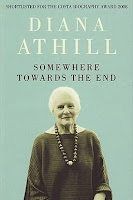 When I first started to work at Random House, I spent a lot of time getting to know the lists. It’s not something that happens organically until you’ve worked at a publishing house for a while, and so I spent a lot of time combing through blogs getting to know the books. One of the first authors that I discovered was Alexander McCall Smith, and I started to read the No. 1 Ladies Detective Agency, quite simply because Sarah W had said so many nice things about the series that my curiosity was piqued. But the books are so short and easy to read, which meant that I devoured about six of them before feeling like I’d eaten too much candy: a little upset in the stomach but still somewhat high on the sugar.
When I first started to work at Random House, I spent a lot of time getting to know the lists. It’s not something that happens organically until you’ve worked at a publishing house for a while, and so I spent a lot of time combing through blogs getting to know the books. One of the first authors that I discovered was Alexander McCall Smith, and I started to read the No. 1 Ladies Detective Agency, quite simply because Sarah W had said so many nice things about the series that my curiosity was piqued. But the books are so short and easy to read, which meant that I devoured about six of them before feeling like I’d eaten too much candy: a little upset in the stomach but still somewhat high on the sugar.
If I have one (slight) criticism, it’s that all of the books are essentially the same: local mystery, personal problem (either Mmas) that needs sorting, and larger life lesson. Yet, this is the very sameness I craved this week while feeling terribly unwell. Familiar characters, familiar situations. The experience of reading these books is akin to watching every episode of ER or Law & Order. And I know a lot of the repitition is for the people picking up the series halfway through…so really, it’s not a true critique of the novels themselves.
The book was delightful, I mean, of course it was — it was just what I needed this week and my only complaint was that I read it too fast. Yesterday as I was waiting for the very late TTC, I finished this book, read the P.S. section of Bonjour Tristesse, and bemoaned the fact that all of my electronic reading gadgets had run out of juice. There’s nothing worse than being a reader caught with no words to feast her eyes upon.
READING CHALLENGES: AMS was born in Zimbabwe. And he’s actually the first African novelist I’ve read in ages for my Around the World in 52 Books challenge.
NOT WORTHY OF A FULL POST NOTE: I also read #32 this week — Pillow Talk by UK chicklit author Freya North. The story was sweet, and I’m not going to lie, there were places where I actually teared up, even if I did get a little embarrassed by a couple throbbing members along the way.
WHAT’S UP NEXT: Pulitzer Prize-winning Olive Kitteridge.








